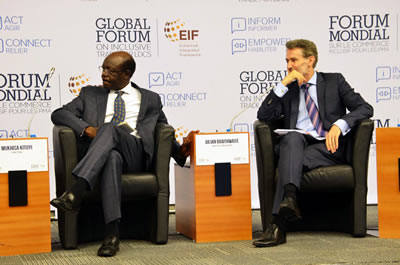With a share of global trade of less than 1%, fresh ideas are needed to bring the world’s poorest countries into the international trading system.
Better trade that boosts prosperity in the world’s poorest countries depends on new “inclusive” policies that prioritize women, young people, small businesses, technological upgrading and lowering barriers, a forum hosted by the World Trade Organization has heard.
The first-ever Global Forum on Inclusive Trade for Least Developed Countries (LDCs) brought together representatives from the 42 LDCs that are also WTO members, as well as from countries that have recently graduated from LDC status, heads of government, international organizations, the private sector and non-governmental organizations.
Speaking at the opening plenary of the 13–14 June event, UNCTAD Secretary-General Mukhisa Kituyi said that LDCs faced falling behind the rest of the world.

“We have seen, during the last eight years alone, LDCs’ share of global trade decline from 1% to 0.8%,”. But, he said, “it has been demonstrated beyond any doubt that, properly used, trade can be a great enabler for development.”
In looking for new routes to inclusive trade, LDCs must prepare to exploit e-commerce and the digital economy, Dr. Kituyi said.
“UNCTAD is helping least developed countries fashion their laws and regulations so that they can get on the fast-moving train of electronic commerce.”
Vulnerabilities and ambiguities
The Secretary-General also said that it would be a mistake to leave out the contribution of women in any inclusive analysis of how to boost trade between LDCs.
“Most regional traders are women, but most regional integration efforts in least developed countries are structured by men for urban men,” Dr. Kituyi said.
“If men are moving containers across borders it’s called regional free trade, if a woman is moving 10 kilos of grain, she’s called a smuggler! So identifying the vulnerabilities and ambiguities in practice and roles is an important area for unlocking potential of women traders, who are going to be major players in this.”
UNCTAD has pioneered analysis of gender in trade and development through tools such as its methodology for assessing the gender-related impacts on trade agreements.
Joining Dr. Kituyi was Britain’s ambassador to the United Nations in Geneva Julian Braithwaite, Central African Republic commerce and industry minister Hassan Come, and Fatoumata Jallow-Tambajang, vice president of The Gambia.
WTO Director General Roberto Azevêdo spoke by video.
"This event is exclusively dedicated to achieving inclusive trade in LDCs – and therefore it could not be more important,” Mr. Azevêdo said.
“Our aim here is to ensure that more and more people benefit from international trade – especially in LDCs. We must work to strengthen the system so that it is responsive to all of our members. And we must build on the various decisions on LDC issues that WTO members have already taken in recent years."
Ms. Jallow-Tambajang said: "I am pleased to say that as part of this forum I am announcing a Call to Action – action needed to use trade to fight poverty around the world, action needed to support the global trading system, action needed to foster inclusive trade. Trade action for LDCs is needed now, amid global uncertainties, a growing trade gap and changes in what is traded and how."
Bright ideas
Other speakers included Princess Abze Djigma of Burkina Faso and Commonwealth Secretary General Patricia Scotland.
On June 14, the forum featured a “Dragon’s Den” business pitching event named after the British television show, which is also known as “Shark Tank”.
Business leaders from Malawi, Bhutan and Samoa – all women – made presentations about their projects, which included examples of adding value to agricultural exports, to an international panel of experts. The winner was Betty Chinyamunyamu, chief executive officer of the National Smallholder Farmers’ Association of Malawi.
Further sessions looked at the African Continental Free Trade Agreement and the WTO’s Trade Facilitation Agreement – relatively new instruments which aim to help LDCs integrate into regional and international trade. All sessions can be viewed on online.
The forum was organized by the Enhanced Integrated Framework (EIF), a multilateral partnership dedicated exclusively to helping LDCs use trade as an engine for growth, sustainable development and reducing poverty.
“It may not have the catchiest name but the work the EIF is doing is critical to help with trade in the poorest countries in the world,” said Sarah Beeching, a moderator at the event.



